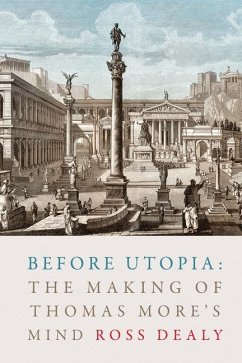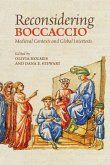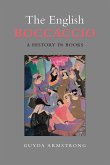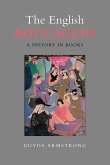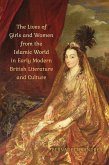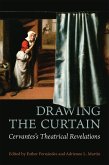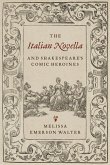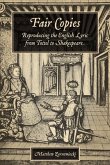- Gebundenes Buch
- Merkliste
- Auf die Merkliste
- Bewerten Bewerten
- Teilen
- Produkt teilen
- Produkterinnerung
- Produkterinnerung
This book explores the influence of Stoicism on the evolution of Thomas More's mind, asserting that More's engagement with the work of Erasmus radicalized his understanding of Christianity and shaped the writing of Utopia.
Andere Kunden interessierten sich auch für
![Reconsidering Boccaccio Reconsidering Boccaccio]() Reconsidering Boccaccio78,99 €
Reconsidering Boccaccio78,99 €![The English Boccaccio The English Boccaccio]() Guyda ArmstrongThe English Boccaccio136,99 €
Guyda ArmstrongThe English Boccaccio136,99 €![The English Boccaccio The English Boccaccio]() Guyda ArmstrongThe English Boccaccio64,99 €
Guyda ArmstrongThe English Boccaccio64,99 €![The Lives of Girls and Women from the Islamic World in Early Modern British Literature and Culture The Lives of Girls and Women from the Islamic World in Early Modern British Literature and Culture]() Bernadette AndreaThe Lives of Girls and Women from the Islamic World in Early Modern British Literature and Culture93,99 €
Bernadette AndreaThe Lives of Girls and Women from the Islamic World in Early Modern British Literature and Culture93,99 €![Drawing the Curtain Drawing the Curtain]() Drawing the Curtain100,99 €
Drawing the Curtain100,99 €![The Italian Novella and Shakespeare's Comic Heroines The Italian Novella and Shakespeare's Comic Heroines]() Melissa WalterThe Italian Novella and Shakespeare's Comic Heroines88,99 €
Melissa WalterThe Italian Novella and Shakespeare's Comic Heroines88,99 €![Fair Copies Fair Copies]() Matthew ZarnowieckiFair Copies96,99 €
Matthew ZarnowieckiFair Copies96,99 €-
-
-
This book explores the influence of Stoicism on the evolution of Thomas More's mind, asserting that More's engagement with the work of Erasmus radicalized his understanding of Christianity and shaped the writing of Utopia.
Hinweis: Dieser Artikel kann nur an eine deutsche Lieferadresse ausgeliefert werden.
Hinweis: Dieser Artikel kann nur an eine deutsche Lieferadresse ausgeliefert werden.
Produktdetails
- Produktdetails
- Verlag: University of Toronto Press
- Seitenzahl: 416
- Erscheinungstermin: 3. März 2020
- Englisch
- Abmessung: 213mm x 165mm x 36mm
- Gewicht: 794g
- ISBN-13: 9781487506599
- ISBN-10: 1487506597
- Artikelnr.: 58296371
- Herstellerkennzeichnung
- Libri GmbH
- Europaallee 1
- 36244 Bad Hersfeld
- 06621 890
- Verlag: University of Toronto Press
- Seitenzahl: 416
- Erscheinungstermin: 3. März 2020
- Englisch
- Abmessung: 213mm x 165mm x 36mm
- Gewicht: 794g
- ISBN-13: 9781487506599
- ISBN-10: 1487506597
- Artikelnr.: 58296371
- Herstellerkennzeichnung
- Libri GmbH
- Europaallee 1
- 36244 Bad Hersfeld
- 06621 890
Ross Dealy is a retired associate professor at St. John’s University, NY.
Preface
Abbreviations
Introduction: In Search of the Meaning of Utopia
Part I: The Mystery of More’s "Either/Or" 1505 Decision: Bodily and Mental
Issues before Late 1504
1. Religion, Law, and Humanism
2. The Lectures on Augustine’s City of God (c. 1501)
3. The Translations of Pico’s Writings (1504)
4. The Despairing Letter to Colet (1504)
5. January 1505: An Ambivalent Decision?
Part II: More’s Radically New, Both/And, Paradigm: Erasmus’ De taedio Iesu
and the Enchiridion, 1503
1. Thomas More’s Transformation: A First Reading of De taedio Iesu and the
Enchiridion
2. Erasmus’ Biography of More
3. The Unexplained Explained
Part III: More’s Lucian, 1506 - and Utopia: Teaching Stoic Two-Dimensional
Christianity
1. Joy and the New Frame of Mind
2. A New Analysis of Saints’ Lives
3. The Role of Cynicus and Menippus
4. Modelling Books I-III of De officiis
5. A Relationship to Utopia?
Part IV: Thomas More as Unitarily "Democritus" and "The Man For All
Seasons": Erasmus’ Preface to The Praise of Folly, 1510
Part V: A Stoic/Morean Praise of Folly, 1511: The Praise of Folly Works
Out More’s Stoic-Framed Transformation
1. The Rhetoric Is Brilliant but Secondary
2. Is Reality Abstract or Worldly? Or Both?
3. Truth Is "Truer Than Truth Itself" (The Stoic Unitary Both/And)
4. Highest Piety Is Unitarily Two-Dimensional
5. Why Is Folly Silent Regarding the Foundation of Her Thinking?
Part VI: Utopian Philosophy, 1516: Epicureanism within a Stoic Honestum/
Utile Frame
1. Moral Philosophy
2. Stoic Corrections of Epicureans: Religious Absolutes
3. Stoic Corrections of Epicureans: Moral Absolutes
4. Stoic Utile Expanded
5. Stoic Justice Expanded
6. Corollaries
Part VII: Utopian Warfare: A Unitary Two-Dimensional Mindset
1. Super Machiavellians?
2. "Utter Loathing of War" and Yet a Thoroughly Militarized State
3. Righteous Cunning, Stratagem, and Ferocity
4. Beyond Machiavelli, a Seamless Mindset
Part VIII: What Wiseman Hythloday Did Not Understand
Conclusion
Bibliography
Abbreviations
Introduction: In Search of the Meaning of Utopia
Part I: The Mystery of More’s "Either/Or" 1505 Decision: Bodily and Mental
Issues before Late 1504
1. Religion, Law, and Humanism
2. The Lectures on Augustine’s City of God (c. 1501)
3. The Translations of Pico’s Writings (1504)
4. The Despairing Letter to Colet (1504)
5. January 1505: An Ambivalent Decision?
Part II: More’s Radically New, Both/And, Paradigm: Erasmus’ De taedio Iesu
and the Enchiridion, 1503
1. Thomas More’s Transformation: A First Reading of De taedio Iesu and the
Enchiridion
2. Erasmus’ Biography of More
3. The Unexplained Explained
Part III: More’s Lucian, 1506 - and Utopia: Teaching Stoic Two-Dimensional
Christianity
1. Joy and the New Frame of Mind
2. A New Analysis of Saints’ Lives
3. The Role of Cynicus and Menippus
4. Modelling Books I-III of De officiis
5. A Relationship to Utopia?
Part IV: Thomas More as Unitarily "Democritus" and "The Man For All
Seasons": Erasmus’ Preface to The Praise of Folly, 1510
Part V: A Stoic/Morean Praise of Folly, 1511: The Praise of Folly Works
Out More’s Stoic-Framed Transformation
1. The Rhetoric Is Brilliant but Secondary
2. Is Reality Abstract or Worldly? Or Both?
3. Truth Is "Truer Than Truth Itself" (The Stoic Unitary Both/And)
4. Highest Piety Is Unitarily Two-Dimensional
5. Why Is Folly Silent Regarding the Foundation of Her Thinking?
Part VI: Utopian Philosophy, 1516: Epicureanism within a Stoic Honestum/
Utile Frame
1. Moral Philosophy
2. Stoic Corrections of Epicureans: Religious Absolutes
3. Stoic Corrections of Epicureans: Moral Absolutes
4. Stoic Utile Expanded
5. Stoic Justice Expanded
6. Corollaries
Part VII: Utopian Warfare: A Unitary Two-Dimensional Mindset
1. Super Machiavellians?
2. "Utter Loathing of War" and Yet a Thoroughly Militarized State
3. Righteous Cunning, Stratagem, and Ferocity
4. Beyond Machiavelli, a Seamless Mindset
Part VIII: What Wiseman Hythloday Did Not Understand
Conclusion
Bibliography
Preface
Abbreviations
Introduction: In Search of the Meaning of Utopia
Part I: The Mystery of More’s "Either/Or" 1505 Decision: Bodily and Mental
Issues before Late 1504
1. Religion, Law, and Humanism
2. The Lectures on Augustine’s City of God (c. 1501)
3. The Translations of Pico’s Writings (1504)
4. The Despairing Letter to Colet (1504)
5. January 1505: An Ambivalent Decision?
Part II: More’s Radically New, Both/And, Paradigm: Erasmus’ De taedio Iesu
and the Enchiridion, 1503
1. Thomas More’s Transformation: A First Reading of De taedio Iesu and the
Enchiridion
2. Erasmus’ Biography of More
3. The Unexplained Explained
Part III: More’s Lucian, 1506 - and Utopia: Teaching Stoic Two-Dimensional
Christianity
1. Joy and the New Frame of Mind
2. A New Analysis of Saints’ Lives
3. The Role of Cynicus and Menippus
4. Modelling Books I-III of De officiis
5. A Relationship to Utopia?
Part IV: Thomas More as Unitarily "Democritus" and "The Man For All
Seasons": Erasmus’ Preface to The Praise of Folly, 1510
Part V: A Stoic/Morean Praise of Folly, 1511: The Praise of Folly Works
Out More’s Stoic-Framed Transformation
1. The Rhetoric Is Brilliant but Secondary
2. Is Reality Abstract or Worldly? Or Both?
3. Truth Is "Truer Than Truth Itself" (The Stoic Unitary Both/And)
4. Highest Piety Is Unitarily Two-Dimensional
5. Why Is Folly Silent Regarding the Foundation of Her Thinking?
Part VI: Utopian Philosophy, 1516: Epicureanism within a Stoic Honestum/
Utile Frame
1. Moral Philosophy
2. Stoic Corrections of Epicureans: Religious Absolutes
3. Stoic Corrections of Epicureans: Moral Absolutes
4. Stoic Utile Expanded
5. Stoic Justice Expanded
6. Corollaries
Part VII: Utopian Warfare: A Unitary Two-Dimensional Mindset
1. Super Machiavellians?
2. "Utter Loathing of War" and Yet a Thoroughly Militarized State
3. Righteous Cunning, Stratagem, and Ferocity
4. Beyond Machiavelli, a Seamless Mindset
Part VIII: What Wiseman Hythloday Did Not Understand
Conclusion
Bibliography
Abbreviations
Introduction: In Search of the Meaning of Utopia
Part I: The Mystery of More’s "Either/Or" 1505 Decision: Bodily and Mental
Issues before Late 1504
1. Religion, Law, and Humanism
2. The Lectures on Augustine’s City of God (c. 1501)
3. The Translations of Pico’s Writings (1504)
4. The Despairing Letter to Colet (1504)
5. January 1505: An Ambivalent Decision?
Part II: More’s Radically New, Both/And, Paradigm: Erasmus’ De taedio Iesu
and the Enchiridion, 1503
1. Thomas More’s Transformation: A First Reading of De taedio Iesu and the
Enchiridion
2. Erasmus’ Biography of More
3. The Unexplained Explained
Part III: More’s Lucian, 1506 - and Utopia: Teaching Stoic Two-Dimensional
Christianity
1. Joy and the New Frame of Mind
2. A New Analysis of Saints’ Lives
3. The Role of Cynicus and Menippus
4. Modelling Books I-III of De officiis
5. A Relationship to Utopia?
Part IV: Thomas More as Unitarily "Democritus" and "The Man For All
Seasons": Erasmus’ Preface to The Praise of Folly, 1510
Part V: A Stoic/Morean Praise of Folly, 1511: The Praise of Folly Works
Out More’s Stoic-Framed Transformation
1. The Rhetoric Is Brilliant but Secondary
2. Is Reality Abstract or Worldly? Or Both?
3. Truth Is "Truer Than Truth Itself" (The Stoic Unitary Both/And)
4. Highest Piety Is Unitarily Two-Dimensional
5. Why Is Folly Silent Regarding the Foundation of Her Thinking?
Part VI: Utopian Philosophy, 1516: Epicureanism within a Stoic Honestum/
Utile Frame
1. Moral Philosophy
2. Stoic Corrections of Epicureans: Religious Absolutes
3. Stoic Corrections of Epicureans: Moral Absolutes
4. Stoic Utile Expanded
5. Stoic Justice Expanded
6. Corollaries
Part VII: Utopian Warfare: A Unitary Two-Dimensional Mindset
1. Super Machiavellians?
2. "Utter Loathing of War" and Yet a Thoroughly Militarized State
3. Righteous Cunning, Stratagem, and Ferocity
4. Beyond Machiavelli, a Seamless Mindset
Part VIII: What Wiseman Hythloday Did Not Understand
Conclusion
Bibliography

